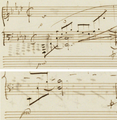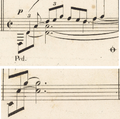



Pedalling
|
b. 36
|
composition: Op. 49, Fantaisie in F minor
..
In GE the category imprint: Differences between sources issues: Inaccuracies in GE |
||||||||||
|
b. 43-48
|
composition: Op. 49, Fantaisie in F minor
..
The whole-bar pedalling entered into A in bar 43, 45 and 47-48 was inaccurately recreated in GE1 – the markings in bar 48 were overlooked. The defect was corrected in GE2. These markings are absent in FE1, which can also be an oversight by the copyist in [FC] or by the engraver of FE (the other possibility – the markings having been added to A later – seems less likely in this context). In the FE2 (→EE) pedalling, probably added by Chopin, it is the consistent use of half-bar pedalling that is noteworthy, contrary to the whole-bar pedalling present in A, while in analogous bars 54-59 – present in all sources. It could be considered an alternative concept, taking into account the effect of the written-down harmonic legato (holding the notes of chords with one's fingers) to a greater extent. In the main text we suggest a variant solution, that is holding the pedal to the end of the bar with an option to release it already in the middle of the bar. category imprint: Differences between sources issues: EE revisions |
||||||||||
|
b. 49-50
|
composition: Op. 49, Fantaisie in F minor
..
In GE1 3 subsequent pedal markings were overlooked – category imprint: Differences between sources issues: Errors in GE , GE revisions |
||||||||||
|
b. 51-53
|
composition: Op. 49, Fantaisie in F minor
..
The origin of the difference in the position of the pedal markings between A and FE is unclear. In A bar 52 is tightly packed, as a result of which the category imprint: Differences between sources; Editorial revisions issues: EE revisions , Inaccuracies in FE , Authentic corrections of FE |
||||||||||
|
b. 64-67
|
composition: Op. 49, Fantaisie in F minor
..
In GE1 there are no pedal markings in these bars. The oversight was corrected in GE2. In FE (→EE) the category imprint: Differences between sources issues: Inaccuracies in FE , Errors in GE , GE revisions |

 sign is wrongly placed to the right of the 3rd crotchet instead of to the left.
sign is wrongly placed to the right of the 3rd crotchet instead of to the left.

 in bar 50. The mistake was corrected in
in bar 50. The mistake was corrected in 